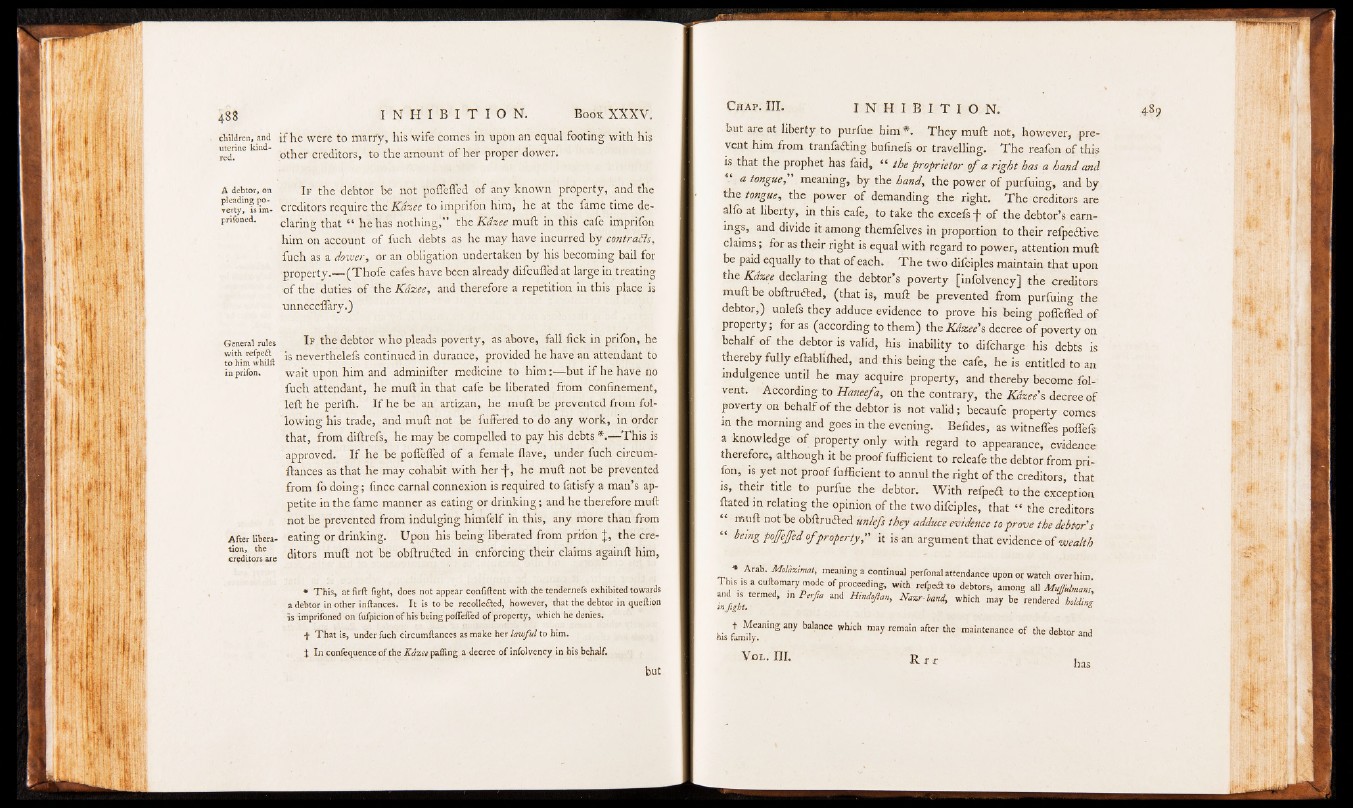
children, and
uterine kindred.
A debtor, on
pleading poverty,
is im-
prifoned.
General rules
with refpett
to him whilft
in prifon.
After liberation,
the
creditors are
if he were to marfy, his wife comes in upon an equal footing with his
other creditors, to the amount of her proper dower.
If the debtor be not poflefled of any known property, and the
creditors require the Kdzee to imprifon him, he at the fame time declaring
that “ he has nothing,” the Kdzee muft in this cafe imprifon
him on account of fuch debts as he may have incurred by contrails,
fuch as a dower, or an obligation undertaken by his becoming bail for
property.—(Thofe cafes have been already difeufled at large in treating
■of the duties of the Kdzee, and therefore a repetition in this place is
unneceflary.)
I f the debtor who pleads poverty, as above, fall fick in prifon, he
is neverthelefs continued in durance, provided he have an attendant to
wait upon him and adminifter medicine to him:— but i f he have no
fuch attendant, he muft in that cafe be liberated from confinement,
left he perifh. I f he be an artizan, he muft be prevented from following
his trade, and muft not be fuffered to do any work, in order
that, from diftrefs, he may be compelled to pay his debts * .— This is
approved. I f he be poflefled of a female Have, under fuch circum-
ftances as that he may cohabit with her f , he muft not be prevented
from fo doing; fince carnal connexion is required to fatisfy a man’ s appetite
in the fame manner as eating or drinking; and he therefore muft
not be prevented from indulging himfelf in this, any more than from
eating or drinking. Upon his being liberated from prifon J, the creditors
muft not be obftru&ed in enforcing their claims againft him,
* T h is , at firft fight, does not appear confiftent with the tenderners exhibited towards
a debtor in other inftances. It is to be recolledfed, however, that the debtor in queftion
■ is imprifoned on fufpicion o f his being poflefled o f property, which he denies.
f T h a t is, under fuch circumflances as make her law ful to him.
% In confequence o f the Kdzee palling a decree o f infolvency in his behalf.
but
but are at liberty to purfue him *. They muft not, however, prevent
him from tranfafting bufinefs or travelling. T h e reafon of this
is that the prophet has faid, “ the proprietor o f a right has a hand and
a tongue, meaning, by the hand, the power of purfuing, and by
the tongue, the power o f demanding the right. The creditors are
alfo at liberty, in this cafe, to take the e x c e fs f o f the debtor’s earnings,
and divide it among themfelves in proportion to their relpedtive
claims; for as their right is equal with regard to power, attention muft
be paid equally to that of each. T h e two difciples maintain that upon
the Kdzee declaring the debtor’s poverty [infolvency] the creditors
muft be obftrufted, (that is, muft be prevented from purfuing the
debtor,) unlefs they adduce evidence to prove his being poflefled of
property; for as (according to them) the Kdzee's decree of poverty on
behalf o f the debtor is valid, his inability to difeharge his debts is
thereby fully eftablifhed, and this being the cafe, he is entitled to an
indulgence until he may acquire property, and thereby become fol-
vent. According to Haneefa, on the contrary, the Kdzee's decree o f
poverty on behalf o f the debtor is not valid; becaufe property comes
in the morning and goes in the evening. Befides, as witnefles poflefs
a knowledge of property only with regard to appearance, evidence
therefore, -although it be proof fufficient to releafe the debtor from prifon,
is yet not proof fufficient to annul the right of the creditors, that
is, their title to purfue the debtor. With refpedt to the exception
ftated in relating the opinion of the two difciples, that “ the creditors
muft not be obftrudted unlefs they adduce evidence to prove the debtor's
“ being pqjfejfed o f property," it is an argument that evidence of wealth
. . , r — uyuu ui, waicn over mm.
T h is is a cuftomary mode o f p roceeding, with r e fp e a to debtors, among all Muttulmans
and is termed, m P erfia and H indojlan, N azr-band, which may be rendered" h eld io l
in fig h t. &
t Meaning any balance which may remain after the maintenance o f the debtor and
ins family. ,
v o l . m . v - -